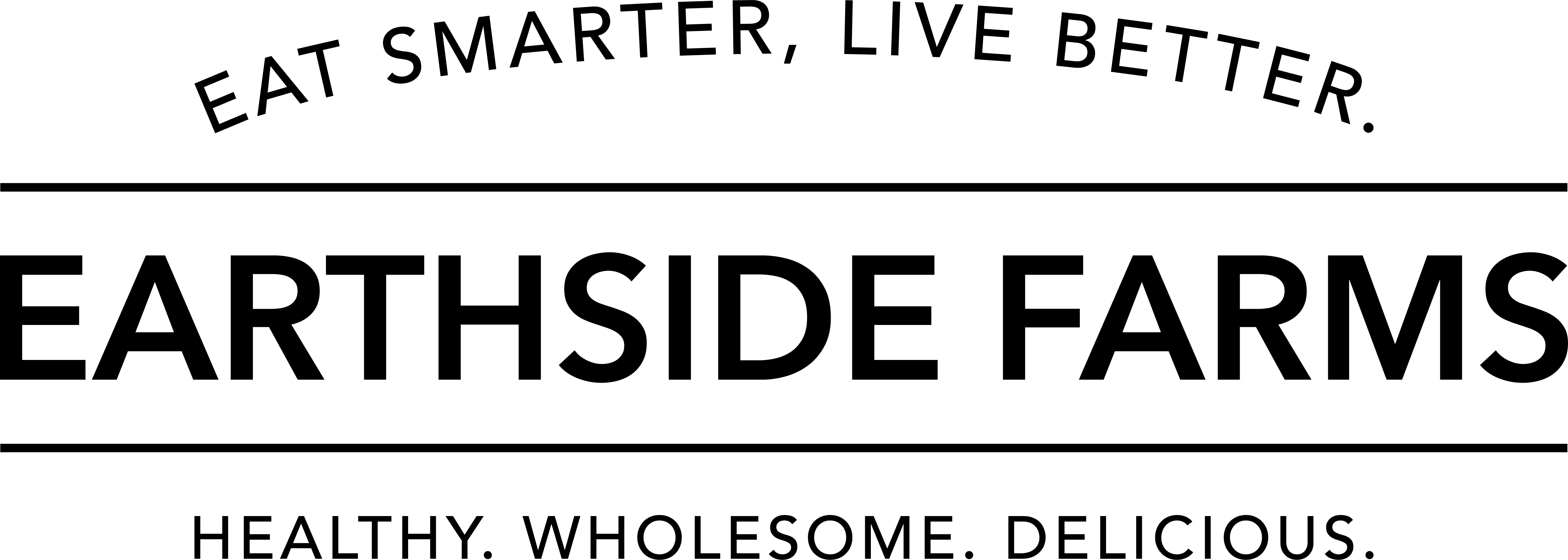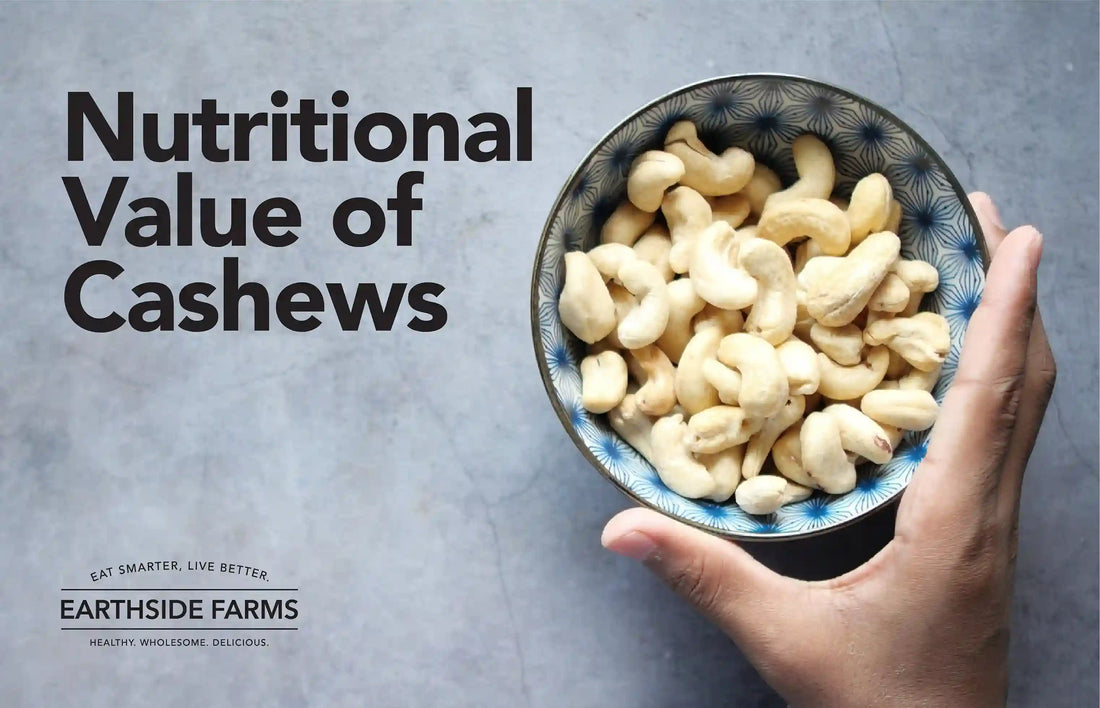Cashews satisfy your cravings while nourishing your body, adding tons of nutritional benefits to your lifestyle.
Packed with heart-healthy fats, plant-based protein, and various essential minerals like magnesium, iron, and copper, cashews offer much more than meets the eye.
Curious how a handful of these small nuts can greatly impact your health?
Let’s examine the nutritional value of cashews in detail, from their protein and fat content to their health benefits.
Nutritional Breakdown of Cashews
Cashews are energy-dense, providing about 553 calories per 100 grams.
That might seem high, but it’s not just empty calories.
They’re packed with fats, protein, and carbohydrates, making them a solid choice for a satisfying snack that keeps you full longer.
Fat
Around 43.8-48.3% of the cashews' weight is fat. But don’t worry—most of it is the healthy kind.
Approximately 79.7% of these fats are unsaturated, with a strong presence of monounsaturated fats (61.8%) that can help lower bad cholesterol.
Protein
Cashews provide 18.2-21.3g of protein per 100g, making them an excellent plant-based source of protein.
Carbohydrates
About 20.5-30.2g of carbs per 100g, with 6g being sugars, mostly sucrose.
Fat Profile
Now, let’s break down the fat content a little more.
Fat often gets a bad rap, but not all fats are created equal.
Cashews contain a good balance of healthy fats that can support heart health.
Monounsaturated fats
Cashews contain 24g of monounsaturated fats per 100g.
Polyunsaturated fats
They also offer 8g of polyunsaturated fats (17.9% of total fat).
Saturated fats
With only 3g of saturated fat per 100g, cashews help control one's intake of unhealthy fats.
Protein Content and Amino Acids
Cashews are an excellent protein source for vegan or plant-based diets.
Each ounce (about 28g) contains around 4g of protein, which may not sound like a lot, but it's impressive in the context of snacks.
The amino acid profile of cashews is also top-notch.
They’re rich in glutamic acid, the most abundant amino acid, contributing around 5g per 100g.
Essential amino acids like leucine, valine, and lysine are also well-represented, making cashews a complete source of plant-based protein.
Carbohydrate Content
As mentioned, cashews contain around 20.5-30.2g of carbs per 100g, with sucrose being the primary sugar.
This is relatively low compared to other sources of sugar, but it still provides a quick energy boost.
Their fiber content (around 3.3g per 100g) balances the carb load.
Fiber Content
Cashews provide 3.3g of fiber per 100g—a small but valuable amount that aids digestion and keeps you feeling full.
A Comprehensive Nutritional Value Breakdown of Cashews
Here's a comprehensive table that encapsulates all the nutritional information for cashews:
| Nutrient | Amount per 100g | Amount per 1oz (28.35g) |
% Daily Value (DV) per 100g
|
| Calories | 553 kcal | 190 kcal | - |
| Total Fat | 43.8–48.3g | 13g | 17%–19% |
| Monounsaturated Fat | 24g | 7.6g | - |
| Polyunsaturated Fat | 8g | 2.3g | - |
| Saturated Fat | 3g | 1g | 15% |
| Protein | 18.2–21.3g | 4g | 8.42% |
| Carbohydrates | 20.5–30.2g | 6–9g | 3%–10% |
| Sugars | 6g | 1.7g | - |
| Fiber | 3.3g | 1g | 12% |
| Iron | 7mg | 1.7mg | 84% |
| Magnesium | 292mg | 74mg | 70% |
| Copper | 2mg | 0.6mg | 244% |
| Phosphorus | 593mg | 168mg | 85% |
| Manganese | 2mg | 0.57mg | 72% |
| Zinc | 6mg | 1.7mg | 53% |
| Potassium | 660mg | 187mg | 14% |
| Calcium | 37mg | 10.5mg | 4% |
| Vitamin K | 34μg | 9.6μg | 28% |
| Thiamine (B1) | 0.4mg | 0.11mg | 35% |
| Vitamin B6 | 0.4mg | 0.11mg | 32% |
| Pantothenic Acid | 1mg | 0.3mg | 17% |
| Niacin | 1mg | 0.28mg | 7% |
| Folate (B9) | 25μg | 7.1μg | 6% |
| Vitamin E | 1mg | 0.28mg | 6% |
| Riboflavin (B2) | 0.1mg | 0.03mg | 4% |
| Vitamin C | 0.5mg | 0.14mg | 1% |
The Health Benefits of Cashews
Cashews offer a variety of health benefits that can support your overall well-being.

Cardiovascular Health
Cashews are packed with monounsaturated fats that profoundly impact heart health. They help reduce LDL (bad) cholesterol levels while promoting higher HDL (good) cholesterol.
This balance is crucial in reducing the risk of cardiovascular diseases.
Studies have shown that a diet rich in nuts, including cashews, is associated with a 19% lower risk of cardiovascular disease (CVD) and a 24% lower risk of coronary heart disease.
In addition, the monounsaturated fats (about 24g per 100g) found in cashews may help regulate blood pressure and support healthy blood vessels.
Cashews are also a good source of magnesium (74mg per 100g), which has been linked to a lower risk of heart disease.
Magnesium helps maintain a healthy heart rhythm and regulates blood sugar levels, which are vital for preventing cardiovascular issues.
Joint Health
Cashews contain anti-inflammatory compounds that may help alleviate symptoms of joint pain, particularly in conditions like arthritis.
While more research is needed to confirm the extent of these benefits in humans, a study of rats with degenerative joint disease found that cashews helped reduce inflammation and pain.
The antioxidants in cashews, such as vitamin E and copper, reduce oxidative stress and inflammation, providing additional support for joint health.
Bone Health
Cashews are a great source of essential minerals for maintaining healthy bones. The key nutrients in cashews that contribute to bone health include:
Phosphorus (139mg per 100g, or 10% DV) helps form and maintain bones and teeth.
Magnesium (74mg per 100g, or 20% of the daily value) is crucial for bone density and the proper functioning of bone-building cells.
Calcium (37mg per 100g), magnesium, and phosphorus support strong, healthy bones.
The vitamin K content in cashews (34μg per 100g, 28% DV) is also important for bone health.
Immune Function
Cashews are loaded with zinc and iron, essential to immune function.
These nutrients help maintain the immune system’s ability to fight off infections and support overall health.
Iron (7mg per 100g, 84% DV) is essential for oxygen transport in the blood and helps maintain energy levels, preventing fatigue.
Zinc (6mg per 100g, 53% DV) supports cell function and helps regulate the immune response, making cashews a powerful food for supporting your body’s defense mechanisms.
Copper (2mg per 100g, 244% DV), a key mineral in cashews, is vital for developing white blood cells, which are essential for fighting infections.
The Nutritional Value of Roasted vs. Raw Cashews
When it comes to cashews, both raw and roasted options have their unique benefits.
Let’s break down the variations in nutrient content and how these affect the health benefits.
| Nutrient | Raw Cashews (per 100g) |
Roasted Cashews (per 100g)
|
| Calories | 553 kcal | 553 kcal |
| Total Fat | 43.8g | 43.8g |
|
Monounsaturated Fat
|
24g | 24g |
|
Polyunsaturated Fat
|
8g | 8g |
|
Saturated Fat
|
3g | 3g |
| Protein | 18.2g | 18.2g |
|
Carbohydrates
|
20.5g–30.2g | 20.5g–30.2g |
| Fiber | 3.3g | 3.3g |
| Iron | 7mg | 7mg |
| Magnesium | 292mg | 292mg |
| Vitamin E | 1mg | 1mg |
| Antioxidants | Higher | Slightly lower |
| Sodium | Low (unless salted) |
Can be higher if salted
|
Raw cashews may be the better choice if you’re looking to maximize antioxidants and maintain the highest possible vitamin content.
On the other hand, roasted cashews are a delicious snack with enhanced flavor, though you may want to be mindful of added salt and slightly lower antioxidant levels.
If you aim for heart health and overall wellness, either option can work well, provided you choose unsalted varieties and consume them in moderation.
Healthy Snacking Tips with Cashews
Cashews are a great snack choice when enjoyed in moderation and with other nutritious ingredients. Here are some easy ways to enjoy them:
-
Stick to 1 small handful (about 28 grams).
-
Mix cashews with raisins, almonds, and seeds
-
Sprinkle on salads, oatmeal, or smoothie bowls
-
Keep a jar at your desk to avoid reaching for chips
-
Eat with a banana or an apple for a balanced snack
-
A handful in a zip-lock bag is perfect for long journeys
The Perfect Healthy Indulgence - Only from Earthside Farms
Ready to transform your snack game and enjoy cashews while retaining all their nutritional value?
With Earthside Farms, you can finally satisfy your cravings without the guilt.

Coconut Caramel Cashews
Craving something sweet?
Let the rich, tropical Coconut Caramel Cashews take you on a mini vacation with every bite.
Coated in a light caramel glaze, the smooth coconut flavor will make your taste buds dance while providing healthy fats, vitamins, and minerals.
Blueberry Vanilla Cashews
Or maybe you’re looking for something just as sweet, but with a fruity twist?
Our Blueberry Vanilla Cashews are gently flavored with the perfect blend of sweet blueberries and smooth vanilla.
Order today and elevate your snack game with Earthside Farms.
Frequently Asked Questions
Let’s answer some of the most common cashew queries to help you make informed choices about incorporating them into your diet.
What are the health benefits of cashews?
Cashews support heart health, bone strength, and immune function due to their healthy fats, protein, and minerals, such as magnesium and iron.
Which is healthier, almonds or cashews?
Cashews are richer in copper and magnesium, which support bone health and immunity, while almonds have more fiber and vitamin E, which is good for skin health.
How many cashews should you eat a day?
1 ounce (about 18 cashews) is a healthy daily serving, providing 190 calories, 4g of protein, and 13g of healthy fats.
Is cashew a superfood?
Yes, cashews are a nutrient-rich snack full of healthy fats, protein, and essential minerals, making them a great addition to any diet.


